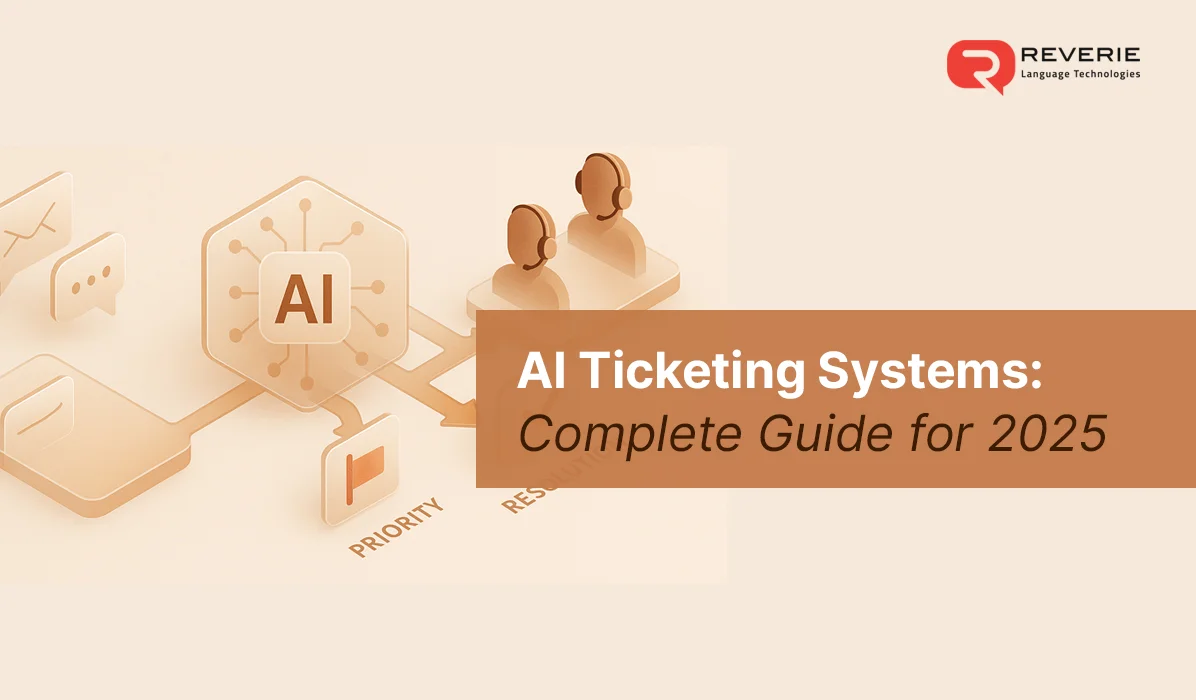Picture this: A frustrated customer calls your support centre at 2 AM with an urgent issue, only to be told they need to wait until business hours. Meanwhile, your support agents are drowning in repetitive ticket classifications during peak hours, spending significant time on manual routing instead of actual problem-solving. This scenario plays out thousands of times daily across Indian enterprises, where traditional ticketing systems struggle to keep pace with customer expectations and operational demands.
Digital transformation is accelerating across India’s diverse market, and traditional ticketing systems are becoming the bottleneck that prevents businesses from delivering the instant, multilingual, and intelligent support that modern customers expect. The solution isn’t just digitisation, it’s an AI ticketing system that understands context, speaks local languages, and learns from every interaction.
What Are AI Ticketing Systems? Beyond Traditional Support Automation
An AI-based ticketing system is like having a super-smart assistant who never sleeps, speaks every languages, and gets better at their job every single day. Unlike traditional helpdesk tools that follow rigid rules, these systems use machine learning and natural language processing to understand what customers really need and route their requests to the right place instantly.
Think of the difference between a traffic light that changes on a timer versus a smart traffic system that adjusts based on real-time traffic flow. Traditional ticketing systems are like that timer-based traffic light—they work, but they don’t adapt. An AI automation ticketing system is like a smart traffic system that sees patterns, predicts problems, and adjusts automatically.
The technology stack behind modern AI ticketing includes several key components:
- Natural Language Processing: Understands customer intent across multiple Indian languages
- Machine Learning Models: Recognise patterns for automated classification and priority assignment
- Predictive Analytics: Forecasts ticket volume and resolution times
- Voice Integration: Enables speech-to-text capabilities for voice-based ticket creation
These systems transform support operations through:
- Instant ticket categorisation and routing based on sentiment and urgency
- Automated response generation with context-aware suggestions
- Real-time language detection and multilingual support
- Predictive escalation before issues become critical
Why Traditional Ticketing Falls Short in India's Digital Economy
Traditional ticketing systems face challenges in India’s digital economy.
The Multilingual Challenge:
- Regional dialect variations affect ticket comprehension
- Extensive agent training required for diverse linguistic support
- Customer satisfaction drops when language preferences aren’t accommodated
Accuracy and Consistency Gaps:
- Human error in ticket routing leads to longer resolution times
- Inconsistent support quality varies across shifts and regions
- Knowledge silos prevent efficient problem resolution
- Lack of historical context affects repeat issue handling
Core Benefits of AI Ticketing Systems for Indian Enterprises
Instant Multilingual Ticket Processing
An AI for ticketing systems delivers automatic language detection and translation across 22 Indian languages, resulting in improved customer satisfaction scores. When a customer submits a ticket in Tamil, the system instantly translates it for a Hindi-speaking agent while preserving the original context and meaning.
Intelligent Priority and Routing Automation
Smart Classification Features:
- ML models analyse ticket content, customer history, and business impact
- Predictive escalation identifies potential VIP customer issues before they escalate
- Resource optimisation routes tickets to agents with relevant expertise and language skills
24/7 Automated Response Capabilities
AI-driven ticketing systems handle common queries outside business hours and provide:
- Instant acknowledgements with estimated resolution times
- Proactive updates based on backend system changes
- Immediate assistance even when human agents aren’t available
Data-Driven Performance Insights
Real-time Analytics Include:
- Track resolution patterns, agent performance, and customer satisfaction
- Identify trends and spot recurring issues before they impact larger customer segments
- Predict staffing needs based on ticket volume forecasting
Essential Features of Enterprise-Ready AI Ticketing Systems
Advanced Natural Language Understanding
Core Capabilities:
- Multi-intent recognition within single tickets
- Sentiment analysis for prioritisation
- Context preservation across conversation threads
- Industry-specific terminology recognition
Intelligent Automation Workflows
Key Features Include:
- Auto-classification: Category, priority, and department assignment
- Smart Routing: Skills-based assignment with workload balancing
- Response Automation: Template suggestions and auto-replies
- Escalation Logic: Time-based and criteria-based escalation rules
Multilingual and Voice Integration
Essential Components:
- Speech-to-Text: Voice ticket creation and updates
- Text-to-Speech: Audio responses for accessibility
- Real-time Translation: Cross-language agent-customer communication
- Regional Dialect Support: Understanding local language variations
Integration and Ecosystem Compatibility
Integration Options:
- CRM Connectivity: Customer history and context integration
- Knowledge Base Linking: Automatic solution suggestions
- Third-party Tool Support: Slack, Teams, email, and chat platforms
- API-first Architecture: Custom integrations and workflow automation
Analytics and Reporting Capabilities
Performance Tracking:
- Performance dashboards with real-time agent and team metrics
- Customer satisfaction tracking, including CSAT and NPS analysis
- Operational insights for resolution time trends and bottleneck identification
- Predictive reporting for future volume and resource requirements
Implementation Guide: Building Your AI Ticketing Strategy
Phase 1: Assessment and Strategic Planning
Key Activities:
- Audit existing ticketing volume, types, and resolution patterns
- Map customer base languages and regional preferences
- Identify systems requiring connectivity (CRM, ERP, knowledge bases)
- Define KPIs for resolution time, customer satisfaction, and cost reduction
Phase 2: Technology Selection and Architecture
Planning Focus:
- Compare AI-native versus traditional systems with AI add-ons
- Ensure scalability planning for peak loads and future growth
- Conduct security assessments for data protection and compliance
- Plan voice capability integration for speech-to-text and multilingual support
Phase 3: Data Preparation and Model Training
Preparation Steps:
- Clean and categorise existing ticket data
- Customise natural language processing for industry-specific terminology
- Design automated routing and escalation logic
- Map agent capabilities for intelligent assignment
Phase 4: Pilot Deployment and Testing
Testing Phase:
- Start with limited rollout for one department or customer segment
- Conduct A/B testing to compare AI-assisted versus traditional handling methods
- Provide agent training on new tools and workflows
- Monitor performance for accuracy, resolution times, and user feedback
Phase 5: Full Deployment and Optimisation
Optimisation Activities:
- Gradual expansion to all departments and customer segments
- Continuous learning to refine models based on real-world performance
- Integration completion to connect all planned systems and workflows
- Change management to support agent adoption and process refinement
AI Ticketing Use Cases Across Industries in India
E-commerce and Retail
Common Applications:
- Order Management: Automated processing of delivery, return, and refund requests
- Product Support: Intelligent routing to specialists based on product categories
- Festival Season Scaling: Dynamic resource allocation during high-traffic periods
- Multilingual Customer Service: Supporting regional language preferences across India
Banking and Financial Services
Use Cases Include:
- Account Issues: Automated classification of balance, transaction, and card problems
- Compliance Routing: Sensitive issue identification and secure handling
- Fraud Detection: Priority escalation for suspicious activity reports
- Regulatory Reporting: Automated documentation for compliance requirements
Healthcare and Telemedicine
Healthcare Applications:
- Appointment Management: Voice-enabled scheduling and rescheduling
- Symptom Triaging: AI-powered priority assignment based on medical urgency
- Insurance Claims: Automated processing and documentation routing
- Multilingual Patient Support: Regional language support for diverse patient populations
Government and Public Services
Public Service Features:
- Citizen Query Management: Automated routing based on department and service type
- Complaint Processing: Priority assignment and tracking for public grievances
- Document Request Handling: Automated processing of certificate and permit applications
- Emergency Response: Rapid escalation and coordination for urgent public safety issues
Overcoming Common Implementation Challenges
Challenge 1: Agent Resistance and Change Management
Solutions:
- Comprehensive training programs and gradual implementation
- Position AI as an assistant rather than a replacement
- Clear communication about role evolution and skill development
Challenge 2: Data Quality and Historical Integration
Best Practices:
- Data cleansing workflows and systematic categorisation
- Start with clean datasets and expand gradually
- Invest in data preparation before model training
Challenge 3: Multilingual Accuracy and Context Preservation
Success Factors:
- Language-specific model training and continuous refinement
- Test with native speakers and regional variations
- Partner with language technology specialists
Challenge 4: Integration Complexity and System Compatibility
Approach:
- API-first approach and phased integration planning
- Prioritise critical integrations and expand incrementally
- Choose platforms with proven integration capabilities
How Reverie’s AI Voice Agent Enables Intelligent, Multilingual Ticketing Systems
Reverie’s voice solutions provide voice-first ticket creation and management through comprehensive features:
Voice-First Ticket Creation and Management
Reverie’s AI Voice Agent Integration Features:
- No-code agentbot builder for voice-enabled ticket submission
- Natural language understanding for intent recognition and automatic categorisation
- Text-to-Speech for audio updates and responses
Voice-First Ticket Creation and Management
Language Capabilities:
- Dialect recognition for understanding regional variations and colloquialisms
- Cultural context for contextually appropriate responses and routing
- Real-time translation for agent-customer communication across language barriers
Getting Started with AI Ticketing Systems
The transformation of customer support through AI ticketing systems isn’t a future possibility—it’s happening now across India’s most forward-thinking enterprises. Organisations that embrace intelligent, multilingual ticketing systems will build the competitive advantages that define market leadership tomorrow.
Think of it like upgrading from a bicycle to a motorcycle—both get you where you need to go, but one does it faster, more efficiently, and with greater capability to handle challenging terrain. AI-driven ticketing systems represent more than operational efficiency—they enable the kind of customer experience that builds loyalty, drives growth, and supports sustainable scaling in India’s diverse market.
Reverie’s Voice AI Agent makes it possible to deploy intelligent ticketing systems that speak your customers’ languages, understand their context, and deliver the responsive support they expect. The comprehensive language technology stack turns every support interaction into an opportunity for customer delight.
The time to act is now. Book a free demo and discover how Reverie can help you build ticketing systems that don’t just manage issues—they prevent them, resolve them intelligently, and transform customer support from a cost centre into a competitive advantage.
Faqs
How do AI ticketing systems handle multiple Indian languages simultaneously?
AI ticketing platforms like that of Reverie’s AI Voice Agent use advanced natural language processing models trained on 22 Indian languages, automatically detecting customer language preferences and routing tickets to appropriately skilled agents while providing real-time translation support.
What's the typical implementation timeline for enterprise AI ticketing systems?
Most organisations see initial benefits within 4-6 weeks, with full deployment and optimisation completed in 3-4 months. The timeline depends on existing system complexity and integration requirements.
Can AI ticketing systems integrate with existing CRM and helpdesk tools?
Yes, modern AI ticketing platforms are built API-first, enabling seamless integration with popular CRM systems, knowledge bases, and communication tools with pre-built connectors for major enterprise platforms.
How do AI systems ensure ticket routing accuracy for complex technical issues?
AI ticketing systems use machine learning models trained on historical data, natural language understanding for context analysis, and skills-based routing algorithms. Accuracy improves continuously as the system learns from resolution patterns.
What security measures protect sensitive customer data in AI ticketing systems?
Enterprise AI ticketing platforms implement encryption, role-based access controls, audit trails, and compliance frameworks while meeting industry security standards and ensuring data privacy across all interactions.


